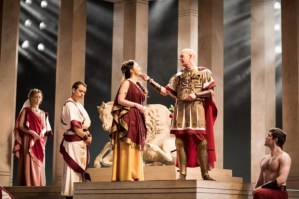Review: Antony and Cleopatra (Royal Shakespeare Theatre, Stratford-upon-Avon)
Iqbal Khan directs Shakespeare’s tragedy as part of the RSC’s Rome season
Like the wavering fortunes of a Roman military commander, the epic spectacle which opens the RSC’s latest season of Shakespeare’s plays suddenly lurches away from grandeur and perilously close to overblown self-importance. As the afternoon press performance of Julius Caesar handed over the imperial baton to Antony and Cleopatra the same evening, the splendour of the earlier production was all but usurped by its successor.
Staged on the same magnificent set by Robert Innes Hopkins, lit beautifully by Tim Mitchell, this play should carry all the same hallmarks of imposing, impressive stature. In a host of hard to pin down ways, it slightly misses its mark with alarming consistency.
Directed by Iqbal Khan, whose Indian Much Ado was greatly praised a few seasons back, it seems on the face of things to have a good deal going for it. As well as the aforementioned look of the whole thing, there’s also a stylish, exotic score by RSC debutant composer Laura Mvula and a bloke-ish, bravado-laced performance from Antony Byrne as Mark Antony, torn between the dutiful soldier and the lovelorn man. It’s significant that the most striking moments generally happen when he is on stage.
Unfortunately, there are lots of decisions that take the edge off what could have been a memorable version of this awkward, stodgy play. Some of these, frankly, verge on the bizarre. Why, for instance, is the crucial sea-battle in which Antony abandons his post to chase after his Cleopatra played out with oversized model boats being pushed around the stage like so many floor-sweepers, more comical than strategic?
Why is Josette Simon‘s eccentric Cleopatra asked to deliver some of Shakespeare’s most forceful female lines in a curious, unplaceable accent, before having to strip entirely and spuriously naked in her final moments? And why is Andrew Woodall’s Enobarbus presented as a tetchy Cockney, strutting the stage like a lost Mitchell brother about to lose his rag at any moment?
It’s not a disaster by any means. The political back-and-forth of Antony’s allegiances and motivations are clearly drawn, although some of the U-turns are pretty hard to swallow. The clever and dynamic set serves the story superbly, as well as being sumptuous in its own right. And there’s a real dramatic sweep to the momentum of the piece, even if a good half-hour could easily be excised from the testing running time.
Perhaps it wasn’t helped by its juxtaposition with the powerful, pacy Julius Caesar earlier in the day. Perhaps the energy was flagging by this time of night. It’s difficult to nail precisely but it’s certainly the weaker of the opening pairing of plays. And I’m not sure that’s really how Shakespeare would have liked it.
Antony and Cleopatra runs at the Royal Shakespeare Theatre, Stratford-upon-Avon, until 7 September 2017.
Running time: 3 hours 25 minutes













